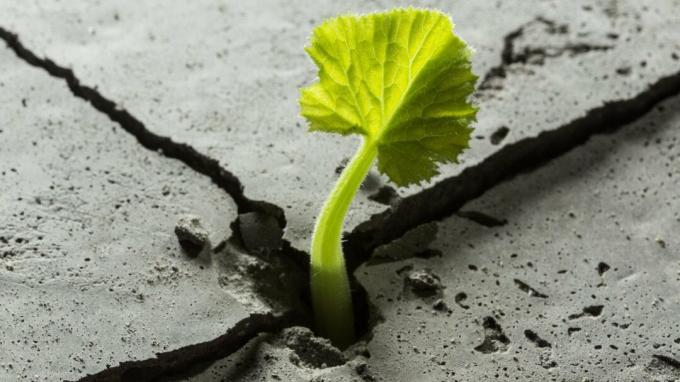5 habits to be more resilient: how to enhance resilience?
Resilience is defined as a person's ability to cope and overcome difficult events in their life in a healthy way.. Someone who presents a high level of resilience is characterized by applying constructive strategies in painful situations or complications of life such as losses (financial, people, separations, etc.), illnesses or possible threats (crime or debts, For example).
- We recommend you read: "Morality and resilience, how sometimes they help each other and sometimes they get in the way"
What is resilience?
To better understand the concept of resilience, we must take into account that it is not about not feeling pain and it is not a way to avoid suffering, but rather the contrary; the first important step to a higher level of resilience would be to remove the expectation that we should never suffer. Problems, pain and suffering are part of life just like joy and happiness. Going through a painful moment and feeling sadness, frustration, or hopelessness about something doesn't mean we did something wrong, it happens to all of us.
For this reason, a first important aspect is acceptance and the ability to see difficult moments not only as something inevitable but also to a certain extent necessary for our personal strength. A second aspect is that we must differentiate between the pain itself, which is caused by an event, and the meaning we give to this pain and the fact of having to go through this event.
As an example, after being diagnosed with a serious illness there is unavoidable pain caused by shock and pain caused by the illness itself. This brings inevitable states of suffering that we cannot control. But there is a second pain, caused by the negative meanings and thoughts that we add to the situation.. For example, ideas like: "I don't deserve that", "that shouldn't be happening to me", "what did I do wrong so that life punishes me in this way."
They are the ways of thinking about the event that can significantly increase the level of suffering and over these if we have control. So, a higher level of resilience is characterized by not adding aggravating meanings to the situation and know how to differentiate between one's own pain and the pain added by what we think of the situation.
The limits of resilience
Obviously the seriousness of the difficult situations that we can go through in life is very varied and in its Therapeutic attention must be differentiated between expected and more everyday traumatic situations and crises. life. As psychologically traumatic experiences, they are considered experiences so stressful that they exceed the coping capacities of the person. Many times, because they start from a really invasive threat to our sense of security and integrity. For example, a serious traffic accident, physical abuse or rape. As a consequence of trauma, people feel that their emotions overwhelm them on a daily basis and memories cannot be transformed into simple stories from the past.
A good level of resilience can help us better cope with these experiences, but it will never be the only form of care they require.. On the other hand, crisis situations are considered those expected or unexpected events that take us out of our daily course and force us to readjust different aspects of our lives. They can be very painful moments too, such as the death of a family member, a diagnosis of a serious illness or the bankruptcy of a business. They are situations in which we depend a lot on our personal resources and we can get out of there better or worse than we entered depending here if a lot on our level of resilience.

Five practices that make us more resilient
We present a series of tips and habits to increase our resilience.
1. Choosing what story we are going to tell ourselves about an event
Although we do not choose to go through a situation, there is always a range within which we decide how we are going to lead with it and what story we are going to tell ourselves about what happened. It is not about telling lies or “thinking positive” and painting a very painful experience pretty, but choosing a role and a position that allows us to lead the event.
For example, those who have been the victim of a robbery or assault understand the indignation and frustration that this experience entails. They were literally victims. However, the victim's story: that she was violated and perhaps demands that justice be done, that they defend her and that she is upset with the legal system that does nothing, puts the person in a position from which he can do nothing beyond lament.
Another story about the same event would be that of acceptance: that we are vulnerable and that no one is safe from being assaulted at some point in their lives. Although it is unfair and should not happen, we finally have to put our things back in order and repair the damage that this experience caused is solely up to us. It is not about justifying or downplaying the seriousness of the matter that happened, but about taking a position that allows us to act or, in this specific case, let go.
2. Find a greater purpose for your pain
Although no one can ever tell us why we really have to go through a difficult time, it has been proven that it helps us that we ourselves add a greater meaning to it. A very clear example of this is raising children, which implies continuous sacrifices such as lack of sleep, enduring tantrums, little personal time, etc.. If we do not believe that it will be for a greater purpose than these moments, which is the formation of a human being, it would be very difficult to maintain the position that is required as parents in the long term.
It is about taking problems as part of life that can teach us something important, seeing suffering as a sacrifice for something most importantly or above all times of crisis, ask yourself, how can I make it so that it becomes one of the best things that have happened to me? past.
3. Focus on the problem at hand – Avoid catastrophic thinking
When we go through a difficult or painful situation, a natural tendency is to automatically think about possible causes of the past and consequences of the future in a catastrophic sense. For example, a separation that can come unexpectedly automatically leads us to think about everything that we should have done better in the past and all that now may be waiting for us in the future by no longer having this person. None of this serves us at the moment to lead with the situation.
Although it is good and recommended to reflect on what has happened in past relationships as part of a process of closure or self-knowledge, in the grieving process it is preferable not to be carried away by possibilities of the past or the future. future. It is preferable to focus on the closest problem of the present and think about what should be done to deal with it. We don't know what it really was or what's going to happen, we just know that it's the least thing we can do now.
4. speak it to tame it
In moments of crisis and suffering, it has been proven that looking for people to talk to and vent helps. The human being is a social being that always benefits from the connection and dialogic exchange with other people. Although, not everyone can accompany us in any situation, in any situation we should think about who we count on to accompany us or simply to talk. Friends or family may not resolve the issue for us, but sharing has a healing effect.
Pronouncing a subject out loud allows us to distance ourselves a bit from it and see it more from the outside. That another person listens to us represents that they accept us despite what we are going through, that is worth a lot. Most of the things that happen to us in life have happened to other people before and we should not isolate ourselves in crisis situations, but seek allies. Allies are safe people, that is, those who are not going to judge us or tell other people and we are not a weight for anyone, as long as we know how to tell the situation, that is not from the complaint but from the share.
5. Finding a way to enjoy challenges
By changing the narrative about a situation we can stop seeing it as a problem and turn it into a challenge. This allows us to create playful strategies or challenges around the different tasks involved in the situation to be solved. A writer who was in a moment of his creativity block told me once that he regained his inspiration by following the challenge of writing at least 1000 words per day regardless of his motivation or the quality of his job. At first it cost him a lot of willpower and he described it as a forced and painful process, at At the same time, he gave her the feeling of doing something and over time helped her get back into her routine. usual.
Another example would be when we know that we must improve our state of health due to some disease and it is difficult for us to start exercising or changing our diet; Connecting with other people who are going through a similar situation and going to the gym or a group course can make the process more playful. Getting together to cook together can be another way to find pleasure in learning a new habit..

conclusions
Accept that all people inevitably go through difficult situations in their life and we cannot expect that we will never suffer. Bear in mind that resilience is something we can learn and train and that we grow with our challenges. The meaning we give to what happens to us and the stories we tell ourselves around the event are crucial for overcoming it.
It is not about thinking positive or denying the pain, but recognizing the challenge and accepting it with responsibility, because even though we may not be at fault, we can choose a lot about what it has happened to us Asking for help and sharing our pain and worries with other people is also resilient. There is a difference between crisis and traumatic experiences. The tips I've shared here apply to crisis situations. Trauma goes beyond a difficult time in life and leaves deeper traces at the neurological level, so it is not resolved with resilience alone..
